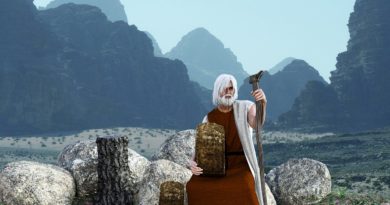How Long Ago Was Genesis Really?
By S. Douglas Woodward
What if the world were 7,500 years old instead of 6,000 years old?
Is a Young Earth view dependent upon the chronology of Bishop Ussher and the King James Bible?
Could it be based, instead, on the Septuagint’s chronology that says Genesis 1 took place 7,500 years ago? What difference would it make?
One of the intriguing linkages between Bible chronology and our worldview is that the age of the earth is typically tied to the date when Adam and Eve were created. If we are committed to a biblical worldview, we often assume that if the Bible chronology of Genesis 5 and 11 indicates that Adam and Eve were created in 4004 B.C. per Ussher’s dating (essentially the same as the King James Version), that the world itself and the universe must be the same age too. There is no obvious gap between Genesis chapter 1 and Genesis chapter 2 and the rest of the Bible thereafter.
Bishop James Ussher and Young Earth Creationism

Young Earth Creationism (YEC) is inexorably tied to this point of view. If you review any YEC video on the internet you will see reference to a young earth of 6,000 years – 4,000 years before Christ and 2,000 years afterwards (rounding).
YEC argues the world cannot be old, like 4.5 billion years old as most scientists claim. To interpret the Bible any other way is a failure to respect the authority of Scripture.
This is the view of Ken Ham, president of Answers in Genesis. He expressed this repeatedly in a debate with Hugh Ross, president and founder of Reasons to Believe, viewable on YouTube.
Both are evangelicals. But while Ken Ham is a YEC advocate, Hugh Ross is a believer in intelligent design and an old earth model.
Both claim to believe the Bible to be God’s infallible, inerrant Word. Nevertheless, they could never see eye to eye because Ham argued that the issue was the authority of Scripture while Ross argued it was an issue of biblical interpretation.
From my perspective, to argue that YEC is a matter of scriptural authority and not interpretation is an unwillingness to debate fairly, and gainsaying the opposing view. Ham is a dogmatist. Only his view can be correct. It is impossible for his interpretation to be wrong. His view is what the Bible says, period.
When did God Create Adam and Eve?

However, let’s assume that the timing of the entire creation is the same as the creation of Adam and Eve. The standard view is that humanity was created in the sixth day of a seven-day week of 24 hours per day. The plain meaning of scripture seems to say this.
The Hebrew word for day is pronounced “yown” and while “yown” can mean many different things such as “the day of Noah” or “the day of the Lord,” Genesis appears to speak of six, twenty four hour periods. That is my view. I do not ascribe to the “day-age” theory also known as concordism. But neither do I feel wedded to the idea that the world has to be less than 10,000 years old.
However, in my book, REBOOTING THE BIBLE, I point out that the biblical chronology, the true chronology, is what the Septuagint teaches. And it’s a view is supported by many ancient sources including Josephus, the Samaritan Pentateuch (partially), and a Latin book whose English translation is The Book of Biblical Antiquities.
This latter book was written and published at the same time as Jesus walked the earth. All of these sources, plus most of the Patriarchs of the early church, the so-called Church Fathers, taught that the age of the earth, along with Adam and Eve’ss creation, took place 5,600 years before Jesus rather than 4,000 years.
Today’s date regarding anno mundi, since the beginning of the world, would be 7,635 years rather than 6,023, or a discrepancy between the two Bibles of 1,612 years.
This chronology indicates that Noah’s Flood was in 3,350 B.C. rather than 2,350 B.C., a difference of one thousand years. And instead of the time between Adam’s creation and Noah’s Flood, there was 2,260 years separation rather than 1,660 years (rounding).
Ussher’s Chronology

My argument is that YEC benefits from going with the Septuagint’s chronology rather than the KJV and Bishop Ussher’s. It is far less compressed going with the LXX. It supplies significant additional evidence that enables the Bible’s timeline to be better reconciled with Mesopotamian and Egyptian archeology.
From an apologetic standpoint, it is a much stronger viewpoint. As it stands right now, the KJV chronology contradicts empirically based archeology by 1,000 years. For instance, the Egyptian pyramids would be several hundred years older than the Tower of Babel, since with the KJV chronology, Babel had to happen about 2,150 B.C.
Nathan Hoffman’s clever video, “Were the Pyramids Built Before the Flood?” makes this plain. Watch his 30-minute video here: https://www.youtube.com/watch?v=VI1yRTC6kGE.
I am not a YEC person. I believe there was a substantial period of time either between Genesis 1:1 and 1:2 or between Genesis 1:1 and Genesis 2:4. How much? I’m not sure. But I believe there was some gap.
Now, I don’t necessarily trust secular science. I find a lot to be liked in the Electric Universe Model, which argues that the earth is older than YEC claims, but far younger than secular science asserts. It may be the happy medium. We shall see as this research is not much more than a couple of decades old.
So, why is there such a difference? Why does the Septuagint chronology differ so much from the KJV and the Masoretic texts version? That’s one of the main topics of Rebooting the Bible. I hope you can find the time to learn why the Septuagint is much more accurate than the KJV.
Rebooting the Bible

While you’re thinking of this, ask yourself whether YEC is actually not just wedded to a 6,000-year-old earth, but to the KJV too.
You see, I believe that in most cases they are. The two are both regarded as what God has revealed. The 6,000-year-old earth is seen as a matter of biblical authority too. And that is unfortunate because, as open-minded persons study and conclude that this view of biblical chronology has too many problems to be viable, they lose faith in the Bible too.
The Septuagint could radically change this equation. But if we won’t consider its place in teaching biblical history, we deny ourselves and our children the right to have an unfettered view of what the Bible really teaches about primeval history, all because of a misguided view of the KJV.
Rebooting the Bible is available now on Amazon in both paperback and Kindle formats.

S. Douglas Woodward, Th.M., MA in Finance (to be completed, May 2019), is 64. He grew up in Oklahoma City, where he lives once again, after working in Boston for six years and Seattle for 21. Doug’s experience lies primarily in business information technology and financial management where he has served as an executive for Oracle, Microsoft, and a Partner at Ernst & Young LLP. He also founded his own consultancy for young companies, Smart Starters, which he managed for 10 years, before becoming Entrepreneur-in-Residence at the University of Oklahoma, Price School of Business, where he has taught classes in entrepreneurship for five years. Over the past seven years, Doug has become a nationally recognized author having written fourteen books on the topics of America’s spiritual history, eschatology, theology, and geopolitics. His books of note include The Final Babylon, Decoding Doomsday, Power Quest (Books One and Two), Lying Wonders of the Red Planet, The Revealing, The Next Great War in the Middle East, and Revising Reality. Rebooting the Bible is number fifteen. He frequently appears on radio and television programs having been interviewed on over 100 different occasions on several dozen different shows. Additionally, he speaks at conferences concerning the multiplicity of topics about which he writes. Doug has two amazing adult children, an incredible daughter-in-law, two fabulous grandsons, and a beautiful wife, Donna, with whom he celebrates over 43 years of marriage. Discover more at www.Facebook.com/sdouglaswoodward and www.faith-happens.com.






